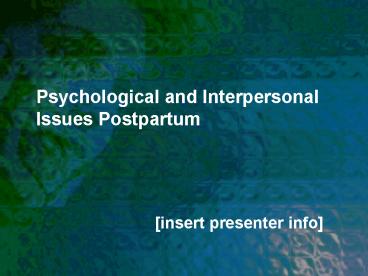Psychological and Interpersonal Issues Postpartum - PowerPoint PPT Presentation
1 / 22
Title:
Psychological and Interpersonal Issues Postpartum
Description:
Wide mood swings. Occasional negative thoughts. Primary Treatment: ... Dysphoric mood. Postpartum Depression. Difficulty concentrating or making decisions ... – PowerPoint PPT presentation
Number of Views:30
Avg rating:3.0/5.0
Title: Psychological and Interpersonal Issues Postpartum
1
Psychological and Interpersonal Issues Postpartum
- insert presenter info
2
Overview
- Postpartum Psychological Issues
- Postpartum Blues
- Postpartum Depression
- Postpartum Psychosis
- Psychological Benefits of Postpartum Exercise
- Miscellaneous Postpartum Psychological Factors
3
Postpartum Psychological Issues
4
Postpartum Blues
- Often viewed as normal
- Affects 40 to 85 of new mothers
- Peaks between postpartum days 3 and 5
- Resolves within 24 to 72 hours
- Subsides without treatment by postpartum day 14
5
Postpartum Blues
- Symptoms
- Sadness, anxiety, irritability
- Uncontrollable tearfulness
- Wide mood swings
- Occasional negative thoughts
- Primary Treatment
- Supportive care and reassurance about the
condition
6
Clinical Depression
- 15 to 25 of the overall population
- lt 25 under the care of a mental health
specialist - Twice as common in women
- Peak incidence during primary reproductive years
(25 to 45 yrs)
7
Postpartum Depression
- A more severe form of postpartum blues
- Affects 10 to 15 of new mothers
- Affects 26 to 32 of all adolescent new mothers
- Symptoms are more intense and longer lasting
8
Postpartum Depression
- Symptoms (DSM IV-R)
- Must be present most of the day, nearly everyday
for more than 2 weeks postpartum - Anhedonia
- Dysphoric mood
9
Postpartum Depression
- Difficulty concentrating or making decisions
- Psychomotor agitation or retardation
- Fatigue
- Changes in appetite and/or sleep patterns
- Recurrent thoughts of death or suicide
10
Postpartum Depression
- Feelings of worthlessness or guilt (especially
focusing on failure at motherhood) - Excessive anxiety
- Frequently focusing on the childs health
11
Who is at risk?
- Family History especially a personal prior
episode of depression - Mother experiencing poor marital
relationship/abusive relationship - Lack of social support and/or child care
stressors - Comorbidities of substance abuse, anxiety or
somatization disorders
12
Postpartum Depression Interventions
- Medication
- For more severe or chronic symptoms
- Prior episodes or family histories w/ good
response to meds - Less costly and less time consuming
- Psycho-therapy
- Chronic psychosocial problems
- Incomplete response to meds
- Concurrent personality problems
- Combination of both
13
Postpartum Psychosis
- Rare condition, affecting 1 to 2 out of 1000
women after childbirth - Presentation can be dramatic
- Onset as early as 48 to 72 hours postpartum
- Symptoms develop within the first 2 weeks after
delivery
14
Postpartum Psychosis
- Early Symptoms
- Restlessness
- Irritability
- Sleep disturbance
- Progressive Symptoms
- Depressed or elated mood
- Disorganized behavior
- Mood swings/ instability
- Delusions
- Hallucinations
15
When might your healthcare provider make a
referral for postpartum psychological problems?
- Thoughts of suicide or homicide
- Presence of psychotic symptoms
- Severely impaired functioning
- Failure to respond to anti-depressant treatment
trial - Comorbid substance abuse
- Clinician preference
16
Psychological Benefits of Postpartum Exercise
17
Psychological Interpersonal Benefits of
Exercise for Postpartum Mothers
- Increases energy level
- Eases tension and stress
- Provides an opportunity to meet other expectant
and postpartum mothers
18
Miscellaneous Postpartum Psychological Factors
19
Bonding With Your Baby
- Your baby will be the most miraculous thing you
have ever seen - Touch is an essential part of bonding even when
there are complications
20
Taking Care of Your Baby
- Expect sleep deprivation
- Postpartum blues is common and occurs 3-5 days
after birth - Most women find that they are isolated during the
first 2-3 months after birth - The PPPT program is a great way to socialize with
other postpartum mothers.
21
A Word on Complicated Pregnancies
- Medical complications during pregnancy can have
an impact on postpartum psychological functioning - May increase the likelihood of blues or
depression - May increase the length of postpartum symptoms
- In most cases, even complicated pregnancies are
not associated with formal psychiatric illnesses
or conditions.
22
Acknowledgements
- CPT Justin Curry
- Psychology Staff Officer
- Directorate of Health Promotion and Wellness
- US Army Center for Health Promotion Preventive
Medicine































